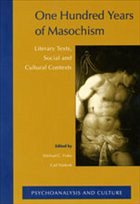Nicht lieferbar

One Hundred Years of Masochism
Literary Texts, Social and Cultural Contexts
Versandkostenfrei!
Nicht lieferbar
Just over a century has passed since the sexologist Richard von Krafft-Ebing coined the term "masochism" in a revised edition of his Psychopathia Sexualis (1890). Put into circulation as part of the fin-de-siècle process through which sexuality and sexual practices considered deviant became medicalized, this suspicious concept grew in significance and explanatory power in the expanding new context of psychoanalytic discourse. Today the study of masochism shows signs of becoming a discipline in its own right, the political, social, and cultural ramifications of which exceed and, indeed, render...
Just over a century has passed since the sexologist Richard von Krafft-Ebing coined the term "masochism" in a revised edition of his Psychopathia Sexualis (1890). Put into circulation as part of the fin-de-siècle process through which sexuality and sexual practices considered deviant became medicalized, this suspicious concept grew in significance and explanatory power in the expanding new context of psychoanalytic discourse. Today the study of masochism shows signs of becoming a discipline in its own right, the political, social, and cultural ramifications of which exceed and, indeed, render problematic, traditional psychoanalytic perspectives on the phenomenon. The essays in this volume demonstrate, however, that the concept of masochism still offers a point of entry into psychoanalytic theory that, while revealing a number of its most vexing insufficiencies and problematic constructions, evokes also a sometimes surprising illuminative potential and capacity to adapt to changing social realities. And as the volume's title is meant to suggest, the authors represented here tend to agree that the continued rich viability of psychoanalytic theory in cultural analysis is best appreciated and ensured through engaging the theory's own social-historical and cultural contexts.
The volume includes clinical perspectives on masochism, and articles on medieval romance, Goethe, Sacher-Masoch, Krafft-Ebing's Psychopathia Sexualis, Turgenev, Tolstoy, Multatuli, Fassbinder, and masochism and postmodernism.
Contents:
Acknowledgments
Sander L. GILMAN: Preface
Michael C. FINKE: Introduction
Otto F. KERNBERG: Clinical Dimensions of Masochism
Robert TOBIN: Masochism and Identity
Victor E. TAYLOR: Contracting Masochism: Pain, Pleasure, and the Language of Power
Madeleine BRAINERD: Stolen Pain: Romance and the Redistribution of Suffering
Roland DOLLINGER: The Self-Inflicted Suffering of Young Werther: An Example of Masochism in the 18th Century
Joachim PFEIFFER: Promethean Renunciation: On the Relationship between Artistry, Creativity, and Masochism in Goethe
Michael C. FINKE: Sacher-Masoch, Turgenev, and Other Russians
Barbara HYAMS: Causal Connections: The Case of Sacher-Masoch
Daniel RANCOUR-LAFERRIERE: Lev Tolstoy's Moral Masochism in the Late 1880s
Carl NIEKERK: Race and Gender in Multatuli's Max Havelaar and Love Letters
Barbara MENNEL: Masochistic Fantasy and Racialized Fetish in Rainer Werner Fassbinder's Ali: Fear Eats the Soul
Contributors
Index
The volume includes clinical perspectives on masochism, and articles on medieval romance, Goethe, Sacher-Masoch, Krafft-Ebing's Psychopathia Sexualis, Turgenev, Tolstoy, Multatuli, Fassbinder, and masochism and postmodernism.
Contents:
Acknowledgments
Sander L. GILMAN: Preface
Michael C. FINKE: Introduction
Otto F. KERNBERG: Clinical Dimensions of Masochism
Robert TOBIN: Masochism and Identity
Victor E. TAYLOR: Contracting Masochism: Pain, Pleasure, and the Language of Power
Madeleine BRAINERD: Stolen Pain: Romance and the Redistribution of Suffering
Roland DOLLINGER: The Self-Inflicted Suffering of Young Werther: An Example of Masochism in the 18th Century
Joachim PFEIFFER: Promethean Renunciation: On the Relationship between Artistry, Creativity, and Masochism in Goethe
Michael C. FINKE: Sacher-Masoch, Turgenev, and Other Russians
Barbara HYAMS: Causal Connections: The Case of Sacher-Masoch
Daniel RANCOUR-LAFERRIERE: Lev Tolstoy's Moral Masochism in the Late 1880s
Carl NIEKERK: Race and Gender in Multatuli's Max Havelaar and Love Letters
Barbara MENNEL: Masochistic Fantasy and Racialized Fetish in Rainer Werner Fassbinder's Ali: Fear Eats the Soul
Contributors
Index



